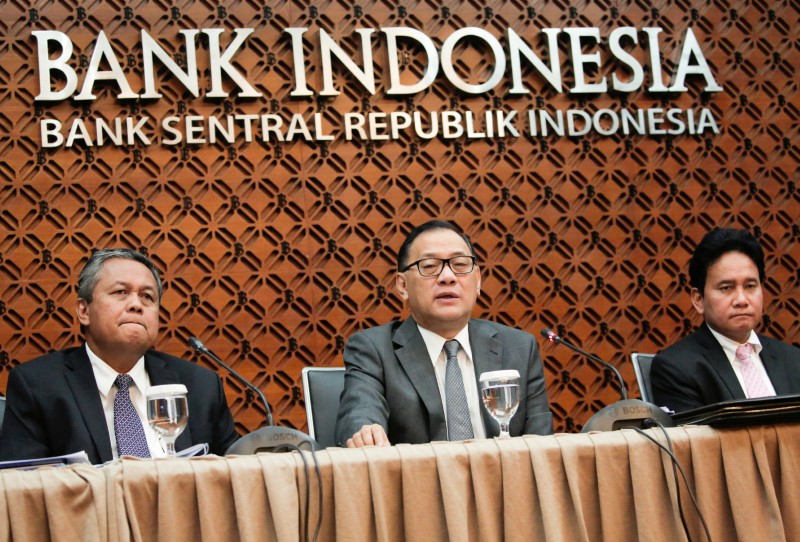By Nilufar Rizki and Gayatri Suroyo
JAKARTA (Reuters) - Indonesia's central bank, citing "escalating" global economic uncertainty, on Thursday held its key interest rate steady as expected and trimmed its growth forecast for 2017.
Bank Indonesia (BI) maintained its benchmark interest rate <IDCBRR=ECI> at 4.75 percent, as forecast by 18 out of 19 analysts in a Reuters poll.
Analysts had said market volatility following Donald Trump's victory meant BI could not cut its benchmark for a seventh time this year.
The rate hold "is in line with BI's cautiousness in responding to the escalating uncertainty in the global financial market after the U.S. election," the central bank said in a statement.
In the wake of the U.S. election, foreign investors sold around 19 trillion rupiah ($523.4 million) of Indonesian stocks and bonds, according to data from the stock exchange and the Finance Ministry.
The rupiah <IDR=> fell sharply after the vote, but then stabilized with the help of BI intervention to ensure it did not drop too rapidly. On Thursday, it was trading at around 13,375 to the dollar, or 2 percent weaker than before Trump's win.
BI Governor Agus Martowardojo told reporters on Thursday that the intervention was in line with market mechanisms. He affirmed that Indonesia will not impose capital controls.
"We would like to emphasize that Indonesia will maintain the system of free flow of capital," he said.
Analysts says the currency could come under pressure again if the Federal Reserve raises interest rates in December.
BI thinks the Fed will hike the U.S. rates by 25 basis points next month, its deputy governor said, and then five more times until the end of 2018.
END OF A CYCLE?
Capital Economics said Thursday's hold "suggests that the central bank is currently more concerned with maintaining a stable exchange rate than supporting the economy. With the U.S. set to start hiking interest rates soon, we think BI's easing cycle is nearing an end."
Weiwen Ng of ANZ said he expects BI "to maintain a neutral monetary policy stance and remain on hold for an extended period of time."
BI has cut its main policy rate this year by a total of 150 basis points.
Despite the cuts, loan growth has continued to weaken. As of September, annual expansion of outstanding loans was at its weakest in nearly seven years, 6.47 percent, as commercial banks grappled with increased levels of bad loans.
Sluggish loan expansion was one reason annual growth in Southeast Asia's largest economy decelerated to 5.02 percent in the third quarter, from 5.18 percent in April-June.
On Thursday, BI amended its forecast for 2016 growth to 5.0 percent instead of a range of 4.9-5.3 percent.
The forecast for 2017 was changed to 5.0-5.4 percent, rather than 5.1-5.5 percent.
"BI faces a difficult balancing act," Capital Economics said. "Despite having cut interest rates six times this year already, the domestic economy could clearly do with some additional support... But the threat of further falls in the rupiah means that BI is likely to act with caution."
